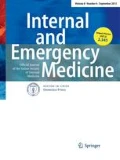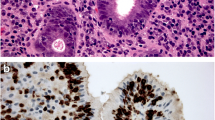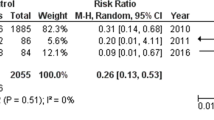Abstract
Probiotics have proven to be useful in the treatment of a number of gastrointestinal diseases. Probiotics may compete directly with Helicobacter pylori, possibly by interference with adherence or by the production of antimicrobial molecules. Lactobacillus reuteri has been shown to inhibit H. pylori in vitro and in vivo, and theoretically may play a role in eradication therapy. The aim of this study was to examine the efficacy of L. reuteri in H. pylori eradication therapy. This was an open label single center study. H. pylori infection was defined as positive gastric histopathology and 13C-UBT. Intervention consisted of L. reuteri (DSM 17938) 108 cfu plus pantoprazole 20 mg twice a day for 8 weeks. Eradication was defined as a negative 13C-UBT, 4–6 weeks post therapy. Compliance was considered good if at least 90 % of the total number of the pills were taken. 21 of 22 subjects completed the study without protocol violation (mean age 52 years; 36 % men). L. reuteri plus pantoprazole twice a day cured 13.6 % (3/22; 95 % CI 2.9–34.9 %) of patients with H. pylori infection by ITT analysis and 14.2 % (3/21; 95 % CI 3.0–36 %) by PP analysis. Overall urease activity assessed before and 4–6 weeks post therapy showed a significant reduction with a difference of mean of 38.8 vs. 25.4 by one-tailed test (P = 0.002). In conclusion, L. reuteri may have a potential role in H. pylori eradication therapy if the cure rate can be improved by changes in dose, dosing interval, or duration of therapy.

Similar content being viewed by others
References
Horiki N, Omata F, Uemura M, Suzuki S, Ishii N, Iizuka Y, Fukuda K, Fujita Y, Katsurahara M, Ito T, Cesar GE, Imoto I, Takei Y (2009) Annual change of primary resistance to clarithromycin among Helicobacter pylori isolates from 1996 through 2008 in Japan. Helicobacter 14:86–90
Megraud F, Coenen S, Versporten A, Kist M, Kist M, Lopez-Brea M, Hirschl AM, Andersen LP, Goossens H, Glupczynski Y, Study Group participants (2013) Helicobacter pylori resistance to antibiotics in Europe and its relationship to antibiotic consumption. Gut 62:34–42
Gatta L, Vakil N, Vaira D, Scarpignato C (2013) Global eradication rates for Helicobacter pylori infection: systematic review and meta-analysis of sequential therapy. BMJ 347:f4587
Power SE, O’Toole PW, Stanton C, Ross RP, Fitzgerald GF (2013) Intestinal microbiota, diet and health. Br J Nutr 12:1–16 [Epub ahead of print]
Schlundt J (2012) “Health and nutritional properties of probiotics in food including powder milk with live lactic acid bacteria”. Report of a joint FAO/WHO Expert Consultation on evaluation of health and nutritional properties of probiotics in food including powder milk with live lactic acid bacteria. FAO/WHO. Retrieved 17 December 2012
Metchnikoff E (1907) Optimistic studies. In: Chalmers Mitchell P (ed) Essais optimistes. Paris. The prolongation of life. Heinemann, London
Macfarlane GT, Cummings JH (2002) Probiotics, infection and immunity. Curr Opin Infect Dis 15:501–506
Ritchie ML, Romanuk TN (2012) A meta-analysis of probiotic efficacy for gastrointestinal diseases. PLoS One 7:e34938
Malfertheiner P, Megraud F, O’Morain CA, Atherton J, Axon AT, Bazzoli F, Gensini GF, Gisbert JP, Graham DY, Rokkas T, El-Omar EM, Kuipers EJ, European Helicobacter Study Group (2012) Management of Helicobacter pylori infection––the Maastricht IV/Florence consensus report. Gut 61:646–664
Mukai T, Asasaka T, Sato E, Mori K, Matsumoto M, Ohori H (2002) Inhibition of binding of Helicobacter pylori to the glycolipid receptors by probiotic Lactobacillus reuteri. FEMS Immunol Med Microbiol 32:105–110
Valeur N, Engel P, Carbajal N, Connolly E, Ladefoged K (2004) Colonization and immunomodulation by Lactobacillus reuteri ATCC 55730 in the human gastrointestinal tract. Appl Environ Microbiol 70:1176–1181
Chung T, Axelsson S (1989) In vitro studies on reuterin synthesis by Lactobacillus reuteri. Microb Ecol Health Dis 2:137–144
Höltzel A, Gänzle MG, Nicholson GJ (2000) The first low molecular weight antibiotic from lactic acid bacteria: reutericyclin, a new tetramic acid. Angew Chem Int Ed Engl 39:2766–2768
Gatta L, Ricci C, Tampieri A, Osborn J, Perna F, Bernabucci V, Vaira D (2006) Accuracy of breath tests using low doses of 13C-urea to diagnose Helicobacter pylori infection: a randomised controlled trial. Gut 4:457–462
Dore MP, Graham DY, Mele R, Marras L, Nieddu S, Manca A, Realdi G (2002) Colloidal bismuth subcitrate-containing twice-a-day quadruple therapy as primary or salvage therapy for Helicobacter pylori infection. Am J Gastroenterol 97:857–860
Carr FJ, Chill D, Maida N (2002) The lactic acid bacteria: a literature survey. Crit Rev Microbiol 28:281–370
Cotter PD, Hill C (2003) Surviving the acid test: responses of gram-positive bacteria to low pH. Microbiol Mol Biol Rev 67:429–453
Midolo PD, Lambert JR, Hull R, Luo F, Grayson ML (1995) In vitro inhibition of Helicobacter pylori NCTC 11637 by organic acids and lactic acid bacteria. J Appl Bacteriol 79:475–479
Lam EK, Tai EK, Koo MW, Wong HP, Wu WK, Yu L, So WH, Woo PC, Cho CH (2007) Enhancement of gastric mucosal integrity by Lactobacillus rhamnosus GG. Life Sci 80:2128–2136
Uchida M, Shimizu K, Kurakazu K (2010) Yogurt containing Lactobacillus gasseri OLL 2716 (LG21 yogurt) accelerated the healing of acetic acid-induced gastric ulcer in rats. Biosci Biotechnol Biochem 74:1891–1894
Imase K, Tanaka A, Tokunaga K, Sugano H, Ishida H, Takahashi S (2007) Lactobacillus reuteri tablets suppress Helicobacter pylori infection––a double-blind randomised placebo-controlled cross-over clinical study. Kansenshogaku Zasshi 81:387–393
Scaccianoce G, Zullo A, Hassan C, Gentili F, Cristofari F, Cardinale V, Gigliotti F, Piglionica D, Morini S (2008) Triple therapies plus different probiotics for Helicobacter pylori eradication. Eur Rev Med Pharmacol Sci 4:251–256
Arakawa T, Watanabe T, Kobayashi K (1997) The immunology of H. pylori: from pathogenesis to prevention. In: Ernst PB, Michetti P, Smith PD (eds) Regulation of acid secretion and peptic ulcer formation by inflammatory cytokines. Lippincott-Raven, Philadelphia, pp 183–199
Noach LA, Bosma NB, Jansen J (1994) Mucosal tumor necrosis factor alpha, interleukin-1 beta, and interleukin-8 production in patients with Helicobacter pylori infection. Scand J Gastroenterol 29:425–429
Gotteland M, Cruchet S, Verbeke S (2001) Effect of Lactobacillus ingestion on the gastrointestinal mucosal barrier alterations induced by indometacin in humans. Aliment Pharmacol Ther 15:11–17
Vandenbergh PA (1993) Lactic acid bacteria, their metabolic products and interference with microbial growth. FEMS Microbiol Rev 12:221–238
Felley CP, Corthe′sy-Theulaz I, Rivero J-LB, Sipponen P, Kaufmann M, Bauerfeind P, Wiesel PH, Brassart D, Pfeifer A, Blum AL, Michetti P (2001) Favourable effects of an acidified milk (LC-1) on Helicobacter pylori gastritis in man. Eur J Gastroenterol Hepatol 13:25–29
Michetti P, Dorta G, Wiesel PH, Brassart D, Verdu E, Herranz M, Felley C, Porta N, Rouvet M, Blum AL, Corthésy-Theulaz I (1999) Effect of whey-based culture supernatant of Lactobacillus acidophilus (johnsonii) La1 on Helicobacter pylori infection in human. Digestion 60:203–209
Sakamoto I, Igarashi M, Kimura K, Takagi A, Miwa T, Koga Y (2001) Suppressive effect of Lactobacillus gasseri OLL 2716 (LG21) on Helicobacter pylori infection in humans. J Antimicrob Chemother 47:709–710
Wang ZH, Gao QY, Fang JY (2013) Meta-analysis of the efficacy and safety of Lactobacillus-containing and Bifidobacterium-containing probiotic compound preparation in Helicobacter pylori eradication therapy. J Clin Gastroenterol 47:25–32
Armuzzi A, Cremonini F, Bartolozzi F, Bartolozzi F, Canducci F, Candelli M, Santarelli L, Cammarota G, De Lorenzo A, Pola P, Gasbarrini G, Gasbarrini A (2001) The effect of oral administration of Lactobacillus GG on antibiotic-associated gastrointestinal side-effects during Helicobacter pylori eradication therapy. Aliment Pharmacol Ther 15:163–169
Saggioro A, Caron M, Pasini M, Bortoluzzi F, Girardi L, Pilone G (2005) Helicobacter pylori eradication with Lactobacillus reuteri. A double-blind-placebo-controlled study. Dig Liver Dis 37(Supp1):S88 [Abstract] P01.49
Acknowledgments
This work was not financially supported.
Conflict of interest
None.
Author information
Authors and Affiliations
Corresponding author
Rights and permissions
About this article
Cite this article
Dore, M.P., Cuccu, M., Pes, G.M. et al. Lactobacillus reuteri in the treatment of Helicobacter pylori infection. Intern Emerg Med 9, 649–654 (2014). https://doi.org/10.1007/s11739-013-1013-z
Received:
Accepted:
Published:
Issue Date:
DOI: https://doi.org/10.1007/s11739-013-1013-z




